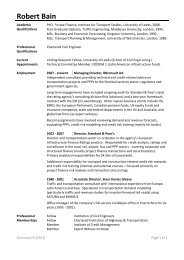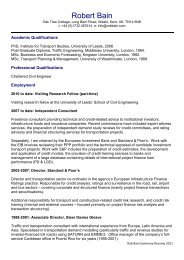Disincentivising overbidding for toll road concessions
Disincentivising overbidding for toll road concessions
Disincentivising overbidding for toll road concessions
- No tags were found...
Create successful ePaper yourself
Turn your PDF publications into a flip-book with our unique Google optimized e-Paper software.
5 │ CONCLUSIONS<br />
5.2 Discussion<br />
While several best practice principles and lessons from international precedent have been presented, it is perhaps<br />
too early in the life cycle of <strong>toll</strong> <strong>road</strong> <strong>concessions</strong> to reach definitive conclusions on what best practice looks like.<br />
Indeed, as the majority of modern Western <strong>concessions</strong> are still in the early period of operations, the existing model<br />
has not yet been tested fully. The current difficulties that some <strong>toll</strong> <strong>road</strong>s face (and failures in other sectors, including<br />
National Express’s default of the Intercity East Coast franchise in Great Britain) are likely to have been exacerbated<br />
by the volume shock created by the global recession. In particular, given the age of many of the <strong>toll</strong> <strong>road</strong> projects<br />
in Australia, financing was likely to have been accessed at, or near, the top of the economic cycle, while the <strong>road</strong>s<br />
opened at the bottom of it. This might lend credence to the argument that the <strong>overbidding</strong> problem would be expected<br />
to sort itself out naturally, given time. If the concessionaire defaults due to having made a bid that later proves to be<br />
excessive, the costs are borne by equity first and fixed income second, as with any business that overestimates its<br />
demand. The ‘invisible hand’ should there<strong>for</strong>e <strong>for</strong>ce bids to become more accurate over time, as bidders learn not to<br />
take on too much risk and lose their credibility with the debt markets. This would be expected to be more likely in the<br />
absence of renegotiations.<br />
Even if this is the case, a government may wish to implement current best-practice processes and deliberately test<br />
alternative structures to speed up the learning process.<br />
In closing, it is worth highlighting that the experiences of, and concerns about, <strong>overbidding</strong> <strong>for</strong> <strong>concessions</strong> do not<br />
lead to the conclusion that <strong>concessions</strong>—or PPPs, more generally—are fundamentally flawed. As stated above,<br />
these arrangements are evolving and most have yet to mature. In such circumstances, it is entirely reasonable <strong>for</strong><br />
a government to intervene to push the industry (and itself) further along the learning curve. The key is to actively<br />
search out lessons that can be used to benefit other PPPs specifically and government procurement practices more<br />
generally. In this context, full, proper and constructive engagement with the private sector has a role to play.<br />
Above all, effective concession design should facilitate the exchange of ideas between public and private sector<br />
players, and provide real opportunities <strong>for</strong> government (and ultimately taxpayers) to benefit from private sector<br />
initiatives, innovation and experience.<br />
Photograph courtesy of Road and Maritime Services, NSW.<br />
65






